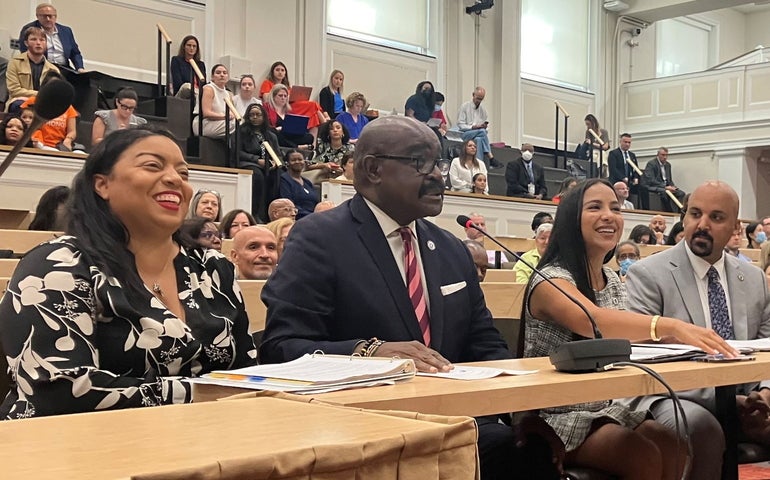Legislators representing marginalized communities and diverse medical leaders touted comprehensive health equity bills as a solution to overcoming long-standing racial disparities during a hearing Wednesday, though insurers warned the bill’s passage could lead to higher costs for patients and employers.
The proposals aiming to bolster health care access and outcomes for all Bay Staters — including by providing MassHealth coverage for all eligible residents regardless of their immigration status — are backed by the Health Equity Compact, a coalition of more than 80 leaders of color representing hospitals, health centers, universities and other community organizations.
Sen. Cindy Friedman, co-chair of the Joint Committee on Health Care Financing, praised the sprawling efforts of the compact and said members must get “very, very serious” about addressing disparate health outcomes. But the Arlington Democrat, who called discrimination “unconscionable,” also raised concerns about the amount of bureaucracy baked into the legislation and whether data collection provisions would ultimately lead to changes in the state’s health care system.
The bills before the committee on Wednesday — sponsored by Reps. Bud Williams and Judith Garcia and Sens. Pavel Payano and Liz Miranda (H 1250 / S 799) — would ensure telehealth payment parity for primary care and chronic disease management, increase funding for safety net hospitals and other providers with a high volume of Medicaid patients, bolster diversity in the health care workforce, and standardize data used to track health equity, among other provisions.
“Without immediate structural changes, our hospitals, community health centers, and most importantly, our residents, cannot bear another health crisis like COVID-19,” Payano said at the hearing. “This legislation is an essential step toward addressing the failings of our health care system and the root causes of health inequities across the commonwealth.”
Black and brown communities are “really, really suffering,” Williams told the committee, as medical providers later shared data about higher rates of illnesses — including heart disease, asthma, diabetes and cancer — among residents of color due to largely socioeconomic factors.
Those inequities are costing Massachusetts nearly $6 billion each year, including $1.5 billion in avoidable health care spending, $1.4 billion in lost labor productivity and $3 billion in premature deaths, according to a report released in June from the compact and the Blue Cross Blue Shield of Massachusetts Foundation.
Attorney General Andrea Campbell shared her support for the bill at the start of the hearing, calling passage of “robust health equity legislation” a priority as her office works to protect health care consumers and enforce parity laws.
Dr. Matilde Castiel, Worcester’s commissioner for health and human services, said her vulnerable patients experience housing instability and unemployment, which in turn affects their health and quality of life. In the city’s lowest income area, the life expectancy is 71.6 years, compared to the state’s average of 80.7 years, said Castiel, a veteran Latina physician.
“It is frustrating to see that our patients need more resources than what the current infrastructure is able to offer,” Castiel told the committee, as she noted Worcester has the highest opioid mortality rate in Massachusetts. “We must change the systems and build better trust and engagement with community members so that we can all live healthier lives.”
Although the Massachusetts Association of Health Plans (MAHP) and member plans say they work to tackle racial disparities daily, the group said the legislation’s provision to mandate telehealth payment parity would increase health care costs. MAHP stopped short of pinpointing a dollar amount in its statement issued just ahead of the hearing Wednesday morning.
“We believe the market is working to address this issue, with some health plans paying the in-person rate, while others pay a percentage of the in-person rate,” MAHP President and CEO Lora Pellegrini said, referring to different reimbursement rates between in-person and virtual visits. “We agree with the Compact that we need to support increasing investments in primary care and behavioral health, but these investments must be done within the state’s cost growth benchmark.”
At the hearing, Leo Blandford, director of health equity and community impact at Outer Cape Health Services, said that expanding access to telehealth services would eliminate barriers for marginalized individuals seeking medical care, such as arranging child care during appointments or navigating transportation options to reach a doctor’s office.
Other components of the legislation would create a secretary of equity in the governor’s Cabinet plus an executive office of equity, and install chief healthy equity officers on the Health Policy Commission and the Center for Health Information and Analysis. Friedman, the committee co-chair, said she was concerned about bureaucracy, as well as data collection requirements, impeding the intended goals of the legislation.
Dr. Frank Robinson, vice president of public health at Baystate Health, told Friedman that “redesigning or re-engineering” government bureaucracy with an equity lens would allow officials to address the root causes of disparities and realize “substantial benefits.”
“It changes the rules at local and state levels so that everyone is valued and everyone has access to resources and opportunities that are essential for health,” Robinson said. “The legislative initiative moves beyond the obvious weaknesses in our health and public health systems, made evident in our evaluation of the pandemic. It directly addresses social, economic and cultural factors, environmental hazards — and limited-opportunity communities are lifted up.”

